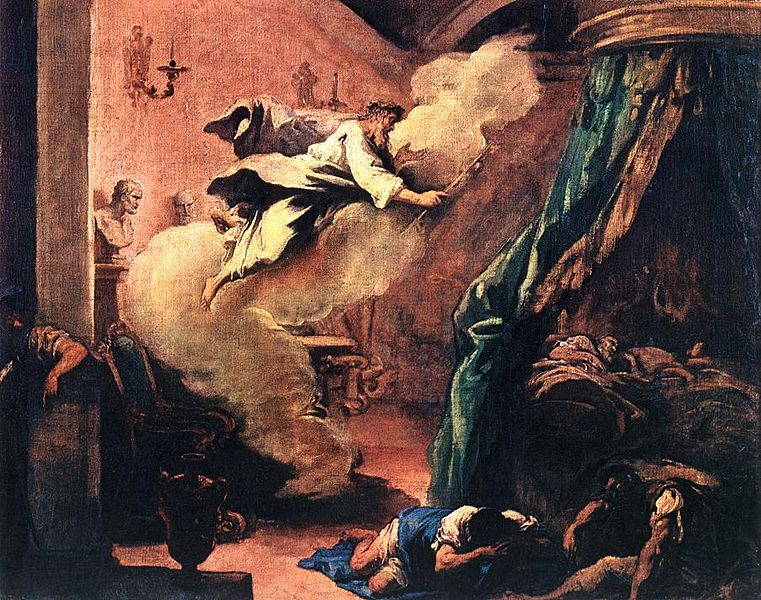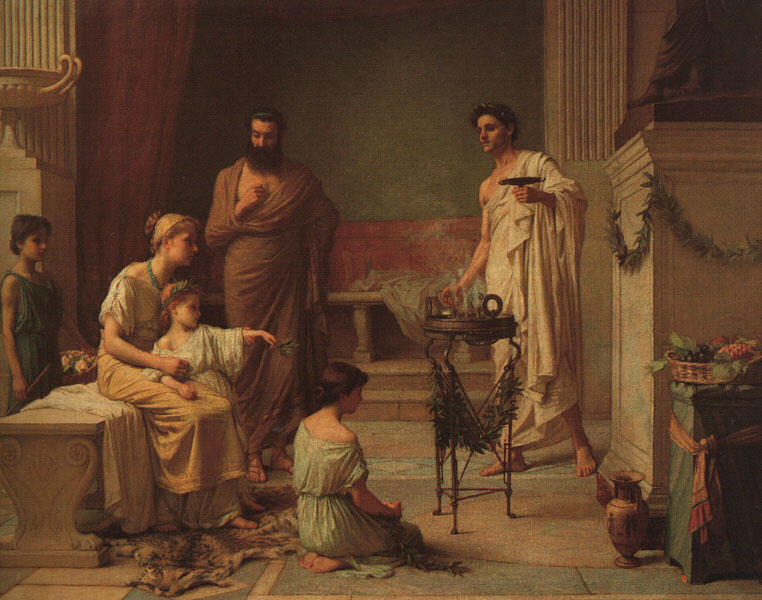THE HEALER ASCLEPIUS IN GREEK MYTHOLOGY
Asclepius was the Greek god of medicine, a hero and a demi-god, and a forebear of all other physicians and doctors.
The Birth of Asclepius
Asclepius was generally considered to be the son of Apollo by Coronis, the beautiful daughter of Phlegyas, king of the Lapiths.
Apollo was said to have observed Coronis, and taken by the mortal’s beauty had made her pregnant. Coronis though was in love with another Lapith, Ischys; and against her father’s advice had wed him.
Apollo though believed that Coronis should have remained faithful to him, and when news of the nuptials reached him via a crow, the gaze of the angry god, burnt the previous white feathers of the crow, so that they would be black for evermore.
Apollo then complained to his sister, Artemis, who killed by Coronis and Ischys, though some say it was Apollo who did the killing.
When Coronis was laid out on the funeral pyre, Apollo decided to rescue his unborn son, cutting him out of Coronis’ womb, giving Asclepius his name, which means “to cut open”.
The location for these events is often debated, for many places in antiquity would claim that the birth of Asclepius took place in their regions, for it would be an acclaim of note.
Apollo was said to have observed Coronis, and taken by the mortal’s beauty had made her pregnant. Coronis though was in love with another Lapith, Ischys; and against her father’s advice had wed him.
Apollo though believed that Coronis should have remained faithful to him, and when news of the nuptials reached him via a crow, the gaze of the angry god, burnt the previous white feathers of the crow, so that they would be black for evermore.
Apollo then complained to his sister, Artemis, who killed by Coronis and Ischys, though some say it was Apollo who did the killing.
When Coronis was laid out on the funeral pyre, Apollo decided to rescue his unborn son, cutting him out of Coronis’ womb, giving Asclepius his name, which means “to cut open”.
The location for these events is often debated, for many places in antiquity would claim that the birth of Asclepius took place in their regions, for it would be an acclaim of note.
Asclepius and chiron
|
Apollo then took Asclepius to Chiron, the wisest of the centaurs, so that his son could be raised and taught the centaur’s skills.
Chiron would teach Asclepius in the heroic skills, just as he had done with many others; Asclepius though would excel in healing and the use of medicinal herbs. Soon, Chiron had taught Asclepius all that he knew, but Asclepius continued to strive for further knowledge. The son of Apollo would be aided in this for after being kind to a snake, the snake licked clean the ears of Asclepius, allowing him to learn knowledge and skill that had previously been hidden to man. The licking clean of ears by snakes was a common theme in Greek mythology, and was often said to be a gift from Apollo. Subsequently, a snake wrapped around a rod would become a symbol of Asclepius. Asclepius would use the new knowledge to make new medicines and new methods of surgery. Asclepius would be aided in his work when the goddess Athena presented him with some of the blood of the Gorgon Medusa. The blood from the left hand side of Medusa could kill, but that which flowed upon the right side had the power to save. |
|
The Wife and children of Asclepius
Asclepius would eventually leave Chiron and would find a partner in Epione, the Greek goddess of soothing of pain; although Epione was a goddess with no known lineage.
Two famous sons of Asclepius and Epione were Machaon and Podalirius. Machaon and Podalirius were named heroes of the Trojan War, and had inherited some of the skill of their father, for they were able to heal the injured Philoctetes when he re-joined the Achaean force. Other sons of Asclepius occasionally mentioned include Telesphoros and Aratus.
Asclepius and Epione also had five daughters together, each of whom were considered to be minor Greek goddesses; Aceso, goddess of healing process, Aglaea, goddess of beauty, Hygieia, goddess of cleanliness, Iaso, goddess of recuperation, and Panacea, goddess of universal remedy. These daughters were in essence the personification of skills held by their father.
Two famous sons of Asclepius and Epione were Machaon and Podalirius. Machaon and Podalirius were named heroes of the Trojan War, and had inherited some of the skill of their father, for they were able to heal the injured Philoctetes when he re-joined the Achaean force. Other sons of Asclepius occasionally mentioned include Telesphoros and Aratus.
Asclepius and Epione also had five daughters together, each of whom were considered to be minor Greek goddesses; Aceso, goddess of healing process, Aglaea, goddess of beauty, Hygieia, goddess of cleanliness, Iaso, goddess of recuperation, and Panacea, goddess of universal remedy. These daughters were in essence the personification of skills held by their father.
Asclepius the Healer
|
Asclepius was often referred to as a hero, and was named as a contemporary of Meleager and Jason, with Hyginius (Fabulae) naming Asclepius as an Argonaut and one of the hunters of the Calydonian Boar.
It was not for his fighting skill that Asclepius was best known though, for his skill in medicine, healing and surgery was unsurpassed. Asclepius’ skill though went further than just delaying the death of individuals, for Asclepius, with the blood of the Medusa, was said to have developed a potion that could bring the deceased back to life. Asclepius was said to have resurrected the likes of Capaneus, Glaucus son of Minos, Lycurgus son of Pronax, King Tyndareus, and most famously, at the behest of Athena, Hippolytus, son of Theseus. |
|
Asclepius though was interfering with the realms of the gods, not least because Capaneus had been killed by Zeus. Hades, was also angry, with the possibility that no more deceased souls would come to his realm.
So to prevent Asclepius resurrecting anyone else, nor teaching any other mortal his skills, Zeus sent down a thunderbolt killing Asclepius. |
|
The killing of his own son greatly angered Apollo, and retribution it was said that Apollo struck down the three Cyclopes, the metalworkers who had crafted the weapons of the gods.
Zeus would have sent his own son to Tartarus for such an act of defiance, but upon the pleading of Leto, Zeus instead banished Apollo for a period of time to live amongst the mortals. During this period of banishment, Apollo was said to have entered the service of King Admetus.
As to whether the Cyclopes were themselves resurrected by Zeus or not, depends upon the ancient source being read.
Zeus would have sent his own son to Tartarus for such an act of defiance, but upon the pleading of Leto, Zeus instead banished Apollo for a period of time to live amongst the mortals. During this period of banishment, Apollo was said to have entered the service of King Admetus.
As to whether the Cyclopes were themselves resurrected by Zeus or not, depends upon the ancient source being read.
The Apotheosis of Asclepius
|
Asclepius was widely referred to as a god, but how could a god be killed by a thunderbolt?
Thus rather than dying some ancient sources claim that the Apotheosis of Asclepius occurred, when the demi-god was made a god with a place upon Mount Olympus. Zeus though would forbid Asclepius from raising from the dead mortal, except on his instruction. In his role as a god of Mount Olympus, Asclepius has been equated to the god Paeon spoken of by Hesiod and Homer. Paeon was the physician of the other gods, healing any injuries received during battle. The story of Asclepius was said to have inspired Hippocrates, the father of modern medicine, to take up the profession. The traditional version of the Hippocratic Oath even included mention of Asclepius - “I swear by Apollo the physician, and Asclepius the surgeon, likewise Hygeia and Panacea, and call all the gods and goddesses to witness, that I will observe and keep this underwritten oath, to the utmost of my power and judgment.” And the Rod of Asclepius remains a symbol of the medical profession. |
|


